Sessions
The State Duma was elected for five years. The Duma worked with annual sessions, within each session, as a rule, two breaks were arranged, at Christmas and at Easter. Each time the Duma was convened and dissolved by the Highest Decrees; in addition, the Duma itself was empowered to arrange breaks in its work. With the outbreak of the First World War, the regular character of the Duma's work was disrupted.
The first session lasted from November 15, 1912 to June 25, 1913, 81 sessions of the General Meeting of the Duma took place.
The second session lasted from October 15, 1913 to June 14, 1914, 111 meetings of the General Meeting of the Duma took place.
On July 26, 1914, an extraordinary one–day session of the Duma took place, dedicated to the allocation of war loans associated with the acute political crisis that preceded the outbreak of the First World War.
The third session began on January 27, 1915; 2 days later, on January 29, immediately after the adoption of the budget, the session of the Duma was declared closed by the emperor.
The fourth session lasted from July 19 to September 3, 1915, after which the Duma was prematurely dissolved by the emperor for vacations, the session then lasted from February 9 to June 20, 1916, 60 meetings of the General Meeting of the Duma were held.
The fifth session began on November 1, 1916. On December 16, the Duma was again dissolved for the holidays. The early dissolution of the Duma turned out to be one of the events that increased the general political tension in the country before the February Revolution. It was widely believed at the time that it was expected that the government would not allow the Duma to convene after the prolonged New Year holidays and would announce its dissolution. However, on February 14, 1917, the emperor announced the continuation of the Duma. At the height of the events of the February Revolution, on February 25, the emperor again suspended the activities of the Duma. The Duma never met again for formal meetings.
On February 27, during a private meeting of members of the Duma, the Provisional Committee of the State Duma was created, which took part in the formation of the Provisional Government, and until the start of its work, that is, February 27 – March 2, it was the self–proclaimed government of Russia. On May 12 – July 19, 1917, eight more private meetings of the Duma were held, which no longer had any legal or political significance.
The Duma was officially dissolved by a decree of the Provisional Government on October 6, 1917 in connection with the appointment of elections to the All–Russian Constituent Assembly.
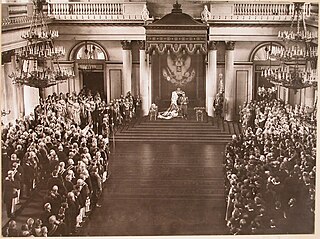
A duma is a Russian assembly with advisory or legislative functions.

Grand Duke Michael Alexandrovich of Russia was the youngest son and fifth child of Emperor Alexander III of Russia and youngest brother of Nicholas II.

Nikolai Vissarionovich Nekrasov was a Russian liberal politician and the last Governor-General of Finland.

Pavel Nikolayevich Milyukov was a Russian historian and liberal politician. Milyukov was the founder, leader, and the most prominent member of the Constitutional Democratic party. He changed his view on the monarchy between 1905 and 1917. In the Russian Provisional Government, he served as Foreign Minister, working to prevent Russia's exit from the First World War.

Baron Boris Vladimirovich Shtyurmer or Stürmer was a Russian lawyer, a Master of Ceremonies at the Russian Court, and a district governor of German descent. He became a member of the Russian Assembly and served as Prime Minister, Minister of Internal Affairs and Foreign Minister of the Russian Empire in the year 1916.
The Union of 17 October, commonly known as the Octobrist Party, was a liberal-reformist constitutional monarchist political party in late Imperial Russia. It represented moderately right-wing, anti-revolutionary, and constitutionalist views.
The Russian Council of Ministers is an executive governmental council that brings together the principal officers of the Executive Branch of the Russian government. This includes the chairman of the government and ministers of federal government departments.
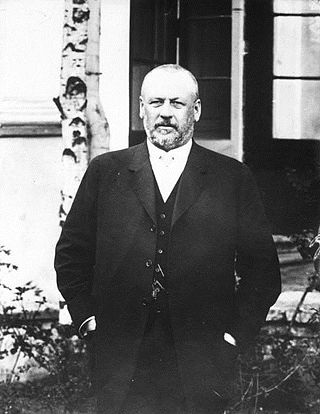
Mikhail Vladimirovich Rodzianko was a Russian statesman of Ukrainian origin. Known for his colorful language and conservative politics, he was the State Councillor and chamberlain of the Imperial family, Chairman of the State Duma and one of the leaders of the February Revolution of 1917, during which he headed the Provisional Committee of the State Duma. He was a key figure in the events that led to the abdication of Nicholas II of Russia on 15 March 1917.

Alexander Ivanovich Guchkov was a Russian politician, Chairman of the Third Duma and Minister of War in the Russian Provisional Government.

Alexander Dmitrievich Protopopov was a Russian publicist and politician who served as Minister of the Interior from September 1916 to February 1917.
The Third Philippine Legislature was the meeting of the legislature of the Philippines under the sovereign control of the United States from October 16, 1912, to February 24, 1916.

The State Duma, also known as the Imperial Duma, was the lower house of the Governing Senate in the Russian Empire, while the upper house was the State Council. It held its meetings in the Taurida Palace in St. Petersburg. It convened four times between 27 April 1906 and the collapse of the Empire in February 1917. The first and the second dumas were more democratic and represented a greater number of national types than their successors. The third duma was dominated by gentry, landowners and businessmen. The fourth duma held five sessions; it existed until 2 March 1917, and was formally dissolved on 6 October 1917.

The Allied leaders of World War I were the political and military figures that fought for or supported the Allied Powers during World War I.
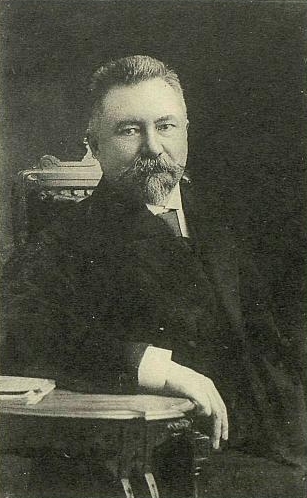
Mikhail Martynovich Alexeyenko was Russian lawyer, professor of finance law, public figure, member of the State Duma of the Russian Empire of 3rd and 4th convocations, and rector of the Kharkov University (1890–1897).
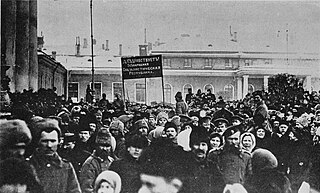
The February Revolution, known in Soviet historiography as the February Bourgeois Democratic Revolution and sometimes as the March Revolution, was the first of two revolutions which took place in Russia in 1917.
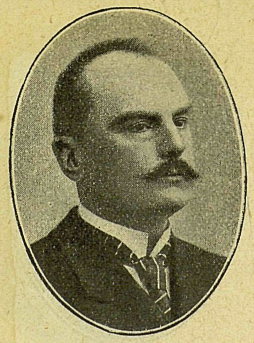
Lyubomir Kleofasovich (Petrovich) Dymsha (1860–1915) – a lawyer, a member of the State Duma of the Russian Empire from Sedletskaya province. Pole, Roman Catholic faith, hereditary nobleman of the Kovno province, State Counselor.

The Council of Ministers of the Russian Empire was the highest executive authority of the Russian Empire, created in a new form by the highest decree of October 19, 1905 for the general "management and unification of the actions of the chief heads of departments on subjects of both legislation and higher state administration". The ministers ceased to be separate officials, responsible to the emperor, each only for their actions and orders.

The State Duma of the Russian Empire of the Second Convocation was a representative legislative body of the Russian Empire, convened after the early dissolution of the State Duma of the 1st convocation. It was elected according to the same rules as the previous Duma and also entered into a sharp confrontation with the Council of Ministers, and also held only one session, from February 20 to June 3, 1907, when it was dissolved. After that, the electoral legislation was changed. The State Duma of the 2nd convocation worked for 102 days.

Ivan Vasilievich Titov was a priest, deputy of the Third and Fourth State Dumas from the Perm Governorate (1907–1917), and a candidate for delegate to the Constituent Assembly (1917).


















